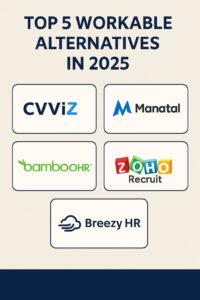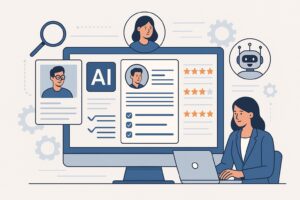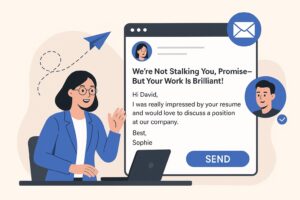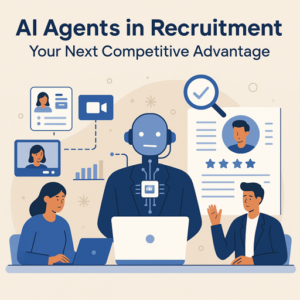Hiring the right talent has never been more crucial—or more complicated. A silent revolution is approaching where businesses are switching to AI agents to recruit top talent faster and efficiently.
AI-powered recruitment tools, a.k.a AI agents, are literally doing it all. From scanning resumes at lightning speed to holding entire conversations with candidates, AI is redefining how recruitment should happen in this fast-growing, ever-changing industrial landscape.
This shift to AI is no more about automating a few mundane or repetitive tasks —it’s about optimization, hyper-personalization, and data-driven decisions.
In a world where every click and response can be measured and made sense of by using AI, companies are asking the ultimate question that is changing the landscape of recruitment for years to come: How can we use AI not just to hire faster, but to hire better?
In this blog, we’ll explore how AI-powered recruitment tools streamline hiring, help organizations make more informed, unbiased hiring decisions, and reduce manual errors and efforts.
We’ll break down the hiring process in various stages and identify the ones where AI is most useful, the tools leading the charge, and the ethical guardrails every recruiter should know about.
Whether you’re an HR leader, a tech-savvy recruiter, or a curious jobseeker, this guide will give you a front-row seat to the future of hiring—one intelligent algorithm at a time.

What Are AI Agents in Recruitment?
AI Agents!
Doesn’t this sound like some futuristic Sci-Fi movie set in the 2050s? Robots in suits, interviewing humans and debating over coffee about which candidate to hire.
Thank God! We are not yet there, but our current situation is just as fascinating as this one. AI agents are software programs powered by artificial intelligence that can perform various hiring tasks autonomously, continuously learn from data, and adapt to human interaction, all of which make them incredibly valuable in the hiring process.
In recruitment, AI agents are becoming the perfect digital assistants with specialized skills humans can’t beat. Think of them as the tireless, hyper-organized team members who never forget to follow up, can read thousands of resumes without blinking, and don’t get hangry during long interview cycles.
How AI Agents Differ from Traditional Automation
Traditional automation in HR was good old-fashioned AI wisdom like auto-responding to emails or status updates in an ATS (Applicant Tracking System). On the other hand, AI agents bring intelligence and continuous learning to the table:
| Traditional Automation | AI Agents |
|---|---|
| Rule-based (if-this-then-that) | Adaptive and learning-based |
| Cannot handle new/unstructured data | Learns from patterns and updates behavior |
| Limited to pre-set workflows | Can engage in dynamic conversations or analysis |
| No personalization | Personalized based on candidate data |
Difference between Traditional Automation and AI Agents in Recruitment.
Types of AI Agents in Recruitment
Here’s a look at the main types of AI agents that are making modern hiring workflows much more efficient and faster:
1. Resume Parsing Agents
Resume Parsing Agents use Natural Language Processing (NLP) to extract and understand key details from resumes such as skills, experience, education, certifications, and so on. These tools then match them to the listed job requirements and shortlist the ones that are the best match to your hiring intent.
2. Chatbots & Virtual Recruiters
Conversational AI agents have now become the first point of contact for applicants taking virtual interviews, scheduling higher-level interviews, being constantly available to the candidates for any doubts and questions, and even nudging the candidates who have abandoned the application midway.
3. Predictive Analytics Agents
These agents use machine learning and predict hiring outcomes based on past data. They can predict candidate dropout risk, cultural fit, or even time-to-fill, giving companies a fair idea about which candidate will be the most relevant one and most likely to join the company.
4. Video Interview Intelligence
These AI agents analyze candidate responses in video interviews, considering not just what is said, but also the tone, pauses, facial expressions, and so on. Based on this, they provide insights about the candidate, the likelihood to join, cultural fit, and so on.
5. Onboarding Agents
Post-hire, AI can help you carry out a seamless onboarding of a candidate. They automate documentation, schedule trainings, and answer questions, giving HR teams more time to focus on personalizing the onboarding experience.
AI agents in recruitment aren’t just software—they’re collaborative tools designed to work alongside humans. When used correctly, they reduce friction in the hiring journey and free up recruiters to focus on what humans do best: build relationships and make value-based decisions.
Key Benefits of AI in Hiring
If traditional hiring was like finding a needle in a haystack, AI agents are like your hiring magnets – it’s fast and precise. But beyond speed, AI agents also offer a strategic edge to the companies that’s reshaping the very nature of talent acquisition.
Let’s list down the core benefits of using AI agents in recruitment:
1. Speed and Efficiency
The biggest benefit of hiring an AI agent for your recruitment is reduced time-to-hire.
- Resume Parsers can scan hundreds of resumes in seconds and list the candidates that are not just a skill fit but also a cultural fit.
- Chatbots engage and screen candidates, shortlisting the most promising talent for the role.
- Interview scheduling is automated, leaving no room for unnecessary to and fro.
2. Cost Savings
Let’s accept it – Hiring is a costly affair. It demands a lot of time, effort, manpower, and the companies can’t afford a bad hire. AI agents help decrease the overall administrative cost by automating:
- Sourcing
- Screening
- Communication
- Assessments
The best part is that all these savings do not come at the cost of the quality of hiring. In fact, the bonus here is, the quality is improving, and companies are able to hire the right talent and have managed to improve their retention rate.
3. Scalable Speed Engagement
Human recruiters have constraints. There are just so many people they can talk to in a day, whereas AI agents do not get tired and can engage with hundreds of candidates in the same day, drastically improving the initial chaos of hiring. AI agents provide:
- Instant replies to FAQs
- Follow-up nudges
- Personalized messages based on the application stage
This keeps the candidates engaged without putting undue pressure on the hiring team so that they can focus on what’s more important.
4. Data-Driven Hiring Decisions
AI doesn’t follow its gut feeling. It closely studies the data and then comes up with the important hiring decisions. Some of the data points AI keeps in mind are:
- Resume content
- Prior performance indicators
- Engagement patterns
- Skills assessments
This helps hiring teams make rational decisions, making sure the companies are hiring the right talent for every role.
5. Enhanced Candidate Experience
Hiring is no longer a one-way communication channel. You have to win the candidate’s heart as much as he needs to convince you he is “The One” for your company. AI agents are humanizing and hyper-personalizing the overall candidate journey by:
- Providing real-time updates and handling candidates’ queries.
- Providing 24*7 interaction windows.
- Customizing content based on candidate behaviour.
AI agents help candidates feel heard and valued even before they have joined the company. This drastically improves the candidate’s sentiment and also boosts the employer’s brand.
6. Better Quality-Of-Hire
Machine learning is literally turning out to be a game-changer in the hiring landscape. By matching applicants based on past success patterns, skill benchmarks, and organizational fit, AI is slowly improving hiring with one machine learning model at a time.
AI agents are continuously improving and learning. The more data they see, the smarter they become—especially when combined with human judgment.
7. Reduced Human Bias
For this point, we would like to stress upon reduced and not eliminated human bias. But, AI agents have been found to be really helpful in:
- Anonymizing applications (removing names, genders, and photos).
- Using structured evaluation criteria rather than gut instincts.
- Promoting consistency in screening across all applicants.
In short, AI agents don’t just help recruiters work faster—they help them work smarter and fairer, unlocking efficiencies while improving the candidate journey.
Stages Where AI Agents Are Beneficial In Recruitment
The journey from “we need someone” to “you’re hired” is long. It involves multiple moving parts – candidate sourcing, screening, interviewing, assessing, and onboarding.
Traditionally, each of these stages involved significant manual effort. But with AI agents in the picture, many of these touchpoints are now faster, smarter, and less prone to error.
Let’s walk through the key recruitment stages and see how AI fits in.
1. Sourcing & Outreach
This is the first touchpoint of your hiring journey where AI has already made a dramatic impact, making the entire process faster and efficient.
What AI does:
- Scans job boards, social media platforms (like LinkedIn), and databases to find potential candidates.
- Uses algorithms to match resumes with job descriptions—even across industries and geographies.
- Sends personalized outreach messages automatically.
2. Resume Screening and Shortlisting
This is the most time-consuming stage in hiring where hiring teams used to spend weeks going through all the resumes that have come their way for a particular position. But scanning resumes is now AI’s playground, reducing the weeks to mere minutes, all the while prioritizing high-fit candidates.
What AI does:
- Uses Natural Language Processing (NLP) to read, understand, and score resumes.
- Matches candidate profiles against job requirements.
- Filters out irrelevant applications instantly.
3. Candidate Engagement and Pre-Screening
Gone are the days of long email chains and missed calls. AI chatbots now handle much of the candidate interaction, all the while screening them for the vacant position.
What AI does:
- Greets candidates, answers common questions, and guides them through the process.
- Conducts pre-screening interviews via chat or voice.
- Collects data on availability, work eligibility, expected salary, etc.
4. Skills Testing and Predictive Assessments
Hiring the right candidate is no longer based on a gut feeling. With machine learning entering this hiring stage, each hiring decision is a well-calculated data data-driven decision with almost zero chances of failing.
What AI does:
- Assigns coding challenges, logical puzzles, or industry-specific scenarios.
- Predicts candidate success based on responses and behavioral data.
- Generates reports to assist recruiter decision-making.
5. Onboarding and Post-Hiring Integration
Once a candidate is selected, AI can make onboarding smoother and more engaging.
What AI does:
- Sends welcome emails and next-step checklists.
- Answer FAQs about benefits, policies, and procedures via chatbot.
- Tracks completion of training modules or document submission.
AI is slowly entering every stage, becoming a crucial part of the whole hiring journey, reducing manual work, enhancing decision-making, and improving the experience for both recruiters and candidates.
Human + AI: Not Either/Or, But Both
Let’s bust a myth before we start this part: “AI is not going to cost you your job.” It is going to speed up, enhance, and improve how you do that job. And if you embrace it, it might just become your most reliable, data-obsessed sidekick.
The conversation about AI in recruitment often swings between extremes: full automation vs. human intuition. But the real magic happens when humans and AI collaborate, bringing out the best in each other.
What AI Does Best
AI is most relevant for the hiring stages, which require pattern recognition, speed, and scale to be crucial, such as:
- Parsing 10,000 resumes in the matter of minutes rather than weeks
- Responding instantly to midnight candidate queries
- Scoring candidates based on skill match
AI reduces cognitive overload by handling repetitive, data-heavy tasks, freeing up recruiters for what they do best.
What Humans Do Best
Human recruiters bring something AI can’t replicate ( at least yet): context, empathy, nuance, and instinct.
- Interpreting tone and body language in interviews
- Making judgment calls on potential and cultural fit
- Coaching candidates and hiring managers
- Handling sensitive conversations (offers, negotiations, feedback)
Hiring is a human decision, and AI should only be a tool to inform and help, not dictate.
In short, the most successful hiring teams of tomorrow won’t be those that outsource everything to AI, but those that learn how to use AI as a strategic partner—to make smarter, fairer, and more human-centric decisions.
FAQs About AI in Recruitment
Here are answers to some of the most frequently asked questions about using AI in the hiring process:
Q1: Can AI completely replace human recruiters?
A: No. AI excels at repetitive, data-heavy tasks like screening resumes or scheduling interviews, but it lacks the human judgment, empathy, and context needed for final hiring decisions. The future is AI agents assisting recruiters.
Q2: Is using AI in recruitment legal?
A: Yes, but with conditions. Recruiters must comply with data privacy laws like GDPR, CCPA, and region-specific regulations (e.g., NYC Local Law 144), especially when using facial recognition or automated scoring.
Q3: Does AI eliminate hiring bias?
A: It can reduce some forms of unconscious bias, like judging names or resumes superficially. However, if trained on biased data, AI may unintentionally perpetuate those biases. Continuous auditing and human oversight are essential.
Q4: How do I get started with AI in recruitment?
A: Begin small—start with AI chatbots or AI resume screening tools. Choose platforms that offer transparency, ethical AI practices, and integration with your current Applicant Tracking System (ATS).
AI Agents – Your Next Competitive Advantage
AI agents in recruitment aren’t just a passing trend—they’re a fundamental shift in how we attract, evaluate, and hire talent. From automating the busywork to predicting success, AI gives recruiters the power to work faster, fairer, and more strategically.
But it’s not a magic wand. The best results come from a human-AI partnership, where recruiters bring empathy and ethics, and AI brings speed and data-driven precision. Together, they can transform not just hiring, but the entire candidate experience.
Whether you’re a startup founder, a global talent leader, or someone who’s just tired of screening 500 resumes before lunch, AI in recruitment is your next competitive advantage. Embrace it wisely, and hire smart.




